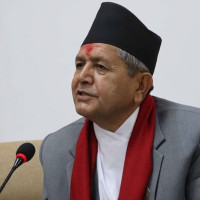- Friday, 24 January 2025
GBIA installs system for low-visibility flight operation
By Our Correspondent,Bhairahawa, Jan. 24: The Gautam Buddha International Airport (GBIA) has introduced a new technology, Required Navigation Performance-Authorisation
Required (RNP-AR), to enable flights to operate even in low-visibility conditions. This system launched on Thursday is expected to significantly reduce flight disruptions caused by poor visibility.
Earlier, the airport had planned to install an Instrument Landing System (ILS) to address visibility issues. But due to non-approval from India, these plans were abandoned. The RNP-AR system, which relies on satellite-based navigation, was then adopted as an alternative.
The GBIA often experiences severe visibility issues particularly during the winter months of December, January, and February due to dense fog. This has frequently disrupted both domestic and international flights.
The RNP-AR system is designed to mitigate these challenges by allowing aircraft to land safely in lower visibility conditions, informed General Manager of the GBIA, Pratap Babu Tiwari.
The RNP-AR system lowers the minimum visibility requirement for landing aircraft.
Previously, aircrafts needed a visibility of 1,800 meters to land using the Instrument Flight Rules (IFR) system while the new RNP-AR system facilitates an aircraft to land with a visibility of just 900 meters, according to Tiwari.
Several international airlines including Qatar Airways, Thai Air Asia, Fly Dubai, and Jazeera Airways had suspended their operations at the GBIA due to visibility issues.
However, with the implementation of RNP-AR, these airlines are expected to resume their flight services to and from the airport.
Fly Dubai has already resumed flights while Jazeera Airways is planning to restart operations from February 1.
However, Qatar Airways is yet to confirm its plans.
The RNP-AR system has been successfully implemented at the Tribhuvan International Airport in Kathmandu. The system at TIA facilitates in minimum 1,100 meters visibility. After a 42-day notification period, the system was officially activated at the Bhairahawa airport on Thursday.
While the system is now operational, foreign airlines will need to obtain approval from their respective aviation authorities and train their pilots before utilising the RNP-AR system at the GBIA, said Tiwari. So far, Fly Dubai has expressed its interest in the implementation of RNP-AR system.
The RNP-AR system is designed for narrow-body (A320) and wide-body (A330) aircrafts. Airlines operating these aircraft types will be required to equip their aircraft with the necessary systems to utilise the RNP-AR approach.

.jpg)














